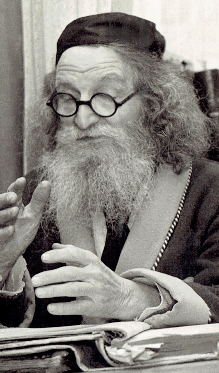David Cohen (rabbi) facts for kids
Quick facts for kids David Cohen |
|
|---|---|
 |
|
| Religion | Judaism |
| Denomination | Orthodox Judaism |
| Personal | |
| Born | 1887 |
| Died | 8 August 1972 |
| Children | She'ar Yashuv,Tzipiah |
| Buried | Mount of Olives Jewish Cemetery |
David Cohen (1887–1972) was a very respected Jewish leader, also known as "Rav Ha-Nazir." This means "the Nazirite Rabbi." He was a rabbi, a deep thinker, and a follower of the famous Rabbi Abraham Isaac Kook. He was known for living a very simple and strict life. He took a special vow called a Nazirite vow when World War I started.
Contents
Early Life and Learning
Rabbi David Cohen was born in 1887 in Maišiagala, a town near Vilnius in modern-day Lithuania. He came from a well-known family of rabbis.
As a young man, he studied at important Jewish schools called yeshivas. He learned from great teachers like Rabbi Yisrael Meir Kagan. Even then, he loved to learn new things beyond the usual subjects. He read the writings of Rabbi Samson Raphael Hirsch and Rabbi Abraham Isaac Kook. He also learned Russian to prepare for university.
Studies in Europe
During the Russian Revolution of 1905, he was briefly arrested twice. His desire to learn more led him to study at a Jewish academy. Later, he went to Germany to study at the University of Freiburg.
When World War I began, he was held as an enemy foreigner. But he was released and went to Basel, Switzerland. There, he joined the Jewish community. He kept studying Jewish texts, but also learned philosophy, classic literature, and Roman law at the University of Basel.
His Special Vows
While in Switzerland, Rabbi Cohen became the head of the Jewish Students' Society. He gave talks on Jewish ideas. It was then that he took a special vow to be a Nazirite for his whole life. This meant he would never cut his hair and would not drink anything made from grapes.
But his simple lifestyle went even further. He became a vegetarian, meaning he did not eat meat. He also avoided wearing anything made of leather. He often took "silence vows," where he would not speak for certain periods. He was silent every Shabbat (Saturday) and once a month. The longest silence was 41 days, from before the month of Elul until after Yom Kippur.
Even though he knew nine languages, he chose to speak only Hebrew. After the Old City of Jerusalem was captured in 1947, he vowed not to leave his home until it was free again. After Israel became independent in 1948, he vowed not to leave Jerusalem. He only left three times in 24 years, and each time, a special rabbinical court had to approve it.
Despite his strict vows, he was very kind and welcoming to everyone who visited him. He knew what was happening in Israel and often shared his opinions on important issues.
Meeting Rabbi Abraham Isaac Kook
A major change in Rabbi Cohen's life happened when he met Rabbi Kook in Switzerland in 1915. Rabbi Kook was a very famous Jewish leader. Rabbi Cohen said, "My life then stood in the balance... I listened to him and was turned into a new man." He decided to stop his other studies and focus completely on Jewish thought.
Working with Rabbi Kook
In 1922, Rabbi Kook invited Rabbi Cohen to come to the Land of Israel. Rabbi Kook had started a yeshiva there, and he wanted Rabbi Cohen to teach. Rabbi Cohen helped plan the lessons, which included history, philosophy, ethics, and Bible studies. He became a teacher of Talmud, ethics, and philosophy.
Rabbi Cohen and Rabbi Kook met every day. Rabbi Kook trusted Rabbi Cohen to edit his important philosophical books. Rabbi Cohen spent his life spreading Rabbi Kook's ideas. He did not publish many of his own books, but he left behind over 30 handwritten works.
His main published work was called Kol Nevu'ah, which came out just before he passed away. This book was the result of his life's work. It talks about Jewish philosophy and a special Jewish way of thinking that focuses on spiritual hearing. He believed that the new Jewish life in Israel would bring a new generation that could even experience prophecy again.
Belief in Redemption
Rabbi Cohen strongly believed in Rabbi Kook's idea that the return to Zion (Israel) and the creation of the State of Israel were steps towards a complete redemption and the Messianic Age. He would even correct other rabbis who did not share this belief. He saw Rabbi Moses Hayyim Luzzatto as a sign of this redemption. He believed that both he and Rabbi Kook followed Luzzatto's teachings.
Family Life
Rabbi Cohen was married to his cousin, Sarah Cohen. They had a daughter and a son. Their daughter, Zfia Goren, married Rabbi Shlomo Goren, who became the Chief Rabbi of the Israeli army and later the Chief Rabbi of Israel. Their son, Rabbi She'ar Yashuv Cohen, became the Chief Rabbi of Haifa. Rabbi Cohen, his wife, and their children were all vegetarians.
Rabbi Cohen passed away in 1972. His memorial day, called a Yahrzeit, is on the 28th of the Hebrew month of Av. In 1977, a special three-volume book called Nezir Ehav was published in his memory.
Images for kids
 | Ernest Everett Just |
 | Mary Jackson |
 | Emmett Chappelle |
 | Marie Maynard Daly |


